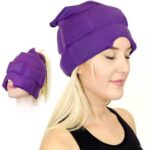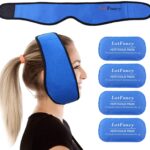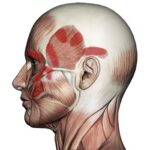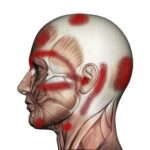
Where Is The Masseter Muscle?
The masseter is a facial muscle and lies in front of the ear and connects the top portion of the upper jaw (zygomatic arch and maxilla) to the lower portion of the bottom jaw (coronoid process, ramus of mandible).
What Movements Does It Control?
- Closes the jaws by drawing up the lower jaw
- Clenches teeth
For detailed anatomy information: Masseter Anatomy Page
Advertisement
What pain and symptoms are associated with the masseter muscle?

Trigger points (TrPs) in the masseter cause pain in the muscle and muscle tightness, restricting opening the mouth. TrPs can also cause the back upper and lower teeth to become hypersensitive to hot, cold, and touch. You may experience toothaches in perfectly healthy teeth.
TWD Recommends
 If you suffer from TMJ, chronic jaw pain, or sinus pain, the Headache Hat will help relieve your pain. The hat has two layers of cooling compartments that encircle the head, providing the recommended cold therapy and compression. It can be pulled down over the face to treat sinus and jaw pain.
If you suffer from TMJ, chronic jaw pain, or sinus pain, the Headache Hat will help relieve your pain. The hat has two layers of cooling compartments that encircle the head, providing the recommended cold therapy and compression. It can be pulled down over the face to treat sinus and jaw pain.
What Causes Trigger Points In the Masseter Muscle?
Grinding your teeth not only affects your teeth but affects many muscles in the face and neck. Most people grind their teeth at night and will need a mouthpiece to stop.
Though gum is soft, the constant chewing movement overworks the muscle causing soreness, tightness, and TrP development.
Ill-Fitting Mouth Pieces
TWD Recommends
 Does your pillow support your head and neck?
Does your pillow support your head and neck?
Sleeping without proper head and neck support is sure to aggravate facial, neck, and shoulder muscles. The Sweetnight Pillow has adjustable filling and is highly recommended for its neck support.
Masseter Muscle Trigger Point Treatment
TWD Recommends
 The best resource to learn how to treat small painful knots is The Trigger Point Therapy Workbook. The authors explain trigger points and their effects in everyday language, not medical speak. I recommend this book to anyone interested in learning to treat their own muscle pain.
The best resource to learn how to treat small painful knots is The Trigger Point Therapy Workbook. The authors explain trigger points and their effects in everyday language, not medical speak. I recommend this book to anyone interested in learning to treat their own muscle pain.
Interesting facts about the masseter muscle
- A tight masseter can cause vocal problems for singers and public speakers.
- Trigger points in the masseter can contribute to bags under the eyes.
TWD Recommends
 The LotFancy Gel Pack for Jaw Pain can be used for hot or cold treatments. Recommended to those who deal with the pain and symptoms of TMJ.
The LotFancy Gel Pack for Jaw Pain can be used for hot or cold treatments. Recommended to those who deal with the pain and symptoms of TMJ.
Clinical diagnoses to which the masseter muscle symptoms may contribute:
- Temporal mandibular joint dysfunction (TMJ)
- Mastoiditis
- Ear pain that is similar to an ear infection
- Tinnitus (ringing in the ear) on the affected side
- Sinusitis
- Jaw Dislocation
- Abscessed Tooth
- Sensitive Teeth
- C2 radiculopathy
Advertisement
Other muscles that should be considered and examined in conjunction with the masseter:
- Pterygoids
- Contralateral Masseter – masseter muscle on the other side
Satellite trigger points associated with the muscle:
- Temporalis
- Medial Pterygoids
- Contralateral Masseter Muscle
Find additional muscles that may contribute to these symptoms:
EAR | JAW PAIN | MASTOIDITIS | SINUS PAIN | TEMPOROMANDIBULAR DISORDER | TINNITUS | TMJ | TOOTH PAIN



